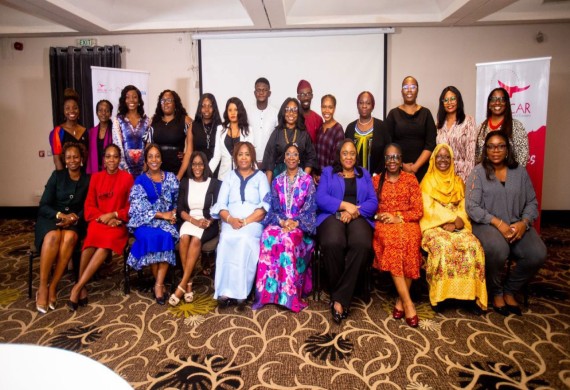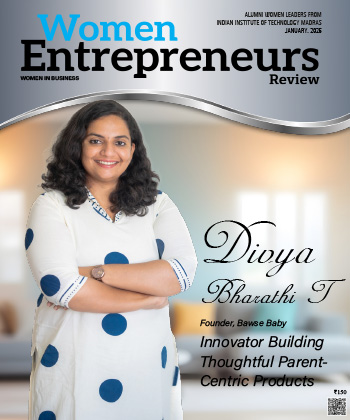
WISCAR collaborates with UN Women to increase the inclusion of Women in Organisations
By: WE Staff | Saturday, 5 November 2022
Women In Successful Careers (WISCAR), with assistance from UN Women, created the Women Empowerment Principles (WEP) to make organisations gender sensitive in order to ensure that more women fill important leadership roles and advance gender equality.
This was the main message of a WEP private sector recognition and rapid training engagement on gender action planning and gender responsive budgeting that was recently hosted at the Wheatbaker in Ikoyi, Lagos, and attended by professional women from various industries.
WISCAR has served as the UN's private sector liaison on gender equality for the past year, and 91 organisations have committed to following the WEP's guiding principles, which include establishing high-level corporate leadership for gender equality, treating men and women fairly at work, ensuring the safety and well-being of both male and female employees, and promoting the education, training, and professional development of women.
It also talks about how to put supply chain, marketing, and company development practises in place that empower women; how to advocate for equality through community action; and how to track and openly report gender equality progress.
Amina Oyagbola, the founder of WISCAR, said during the event that the organisation is focused on leadership, mentorship, and advocacy for women. This is accomplished by increasing the professional women's capacity to remain in the workforce, advance up the career ladder, and have a positive impact on society through the policies they create.
Fabia Ogunmekan, the organization's executive director, claimed that while women work hard and strive for perfection to complete tasks, having a majority of women in leadership positions will eventually help organisations thrive for the good of everybody.
Ogunmekan said, “We believe that the private sector is critical to letting that happen. The government cannot do it alone; the private sector is known to deliver and execute. So, our work is to show the private sector that we are investing in women to achieve gender equality through the strategic framework of WEP
“These include fair working conditions for women, maternity and paternity leaves benefits, things that empowers employees to put in their best. They are practicable tools that if organisations sign up to, it will help them promote gender equality and women’s empowerment.”
Patience Ekeoba, national programme officer for UN Women, stressed in her remarks that companies must implement the WEP in order for them to track and report their progress.
"The WEPS are a set of seven guiding principles developed by UN Women and the United Nations Global Compact to drive private sector initiatives toward gender equality and the sustainable development goals, acknowledging the private sector as a catalyst for change in this area," the speaker said.
"Around the world, we have witnessed the undeniable influence of women's leadership in directing the COVID-19 recovery process. Many women hold senior leadership positions in Nigeria's private sector, which deserves praise for this. We regard this as a genuine chance to improve the status of women's representation in Nigeria's leadership by taking into account their experiences and abilities."
WEPs have partnered with the business sector to address major issues like the gender wage gap, sexual harassment, and discrimination, as well as to promote gender-responsive procurement and work-life balance. As we establish better societies, the private sector can implement organisational rules that support women's particular needs and guarantee their voices are heard in leadership and decision-making at all levels.
Most Viewed
- 1 Women's Health Startup HerMD Closing Doors Amid Industry Challenges
- 2 5 Famous Women in Indian Armed Forces
- 3 Saudi Women No longer Require Male Permission for Clothing Choices, says Prince MbS
- 4 Kolkata Medtech Startup Innovodigm Raises Rs 5.5 Crore Seed Funding Led by IAN Group
- 5 Yamunanagar's Kashish Kalra Honoured after Securing 111th Rank in UPSC Civil Services Exam
- 6 Madurai Appoints Its First Woman Corporation Head
- 7 IAS Vijayalakshmi Bidari Appointed as the new Nagpur Divisional Commissioner
- 8 American Entrepreneur Lucy Guo Overtakes T Swift to become Youngest Female Billionaire
- 9 ICC Women's World Cup 2025 Trophy Showcased at Indore's Holkar Stadium
- 10 Aparna Saxena's Beauty Venture AntiNorm Launches in India
- 11 Vidya Nataraj Co-Founded BlueStone Jewellery & Lifestyle files IPO
- 12 5 Women Freedom Fighters of India
- 13 Dr. G Krishnapriya appointed as CEO for Trichy
- 14 M3M & Sirona Partner to Introduce Menstrual Hygiene Vending Machines in 15 Locations
- 15 Punjab Govt launches SHE Cohort 3.0 Supporting Tech-led Women Startups
- 16 Indian origin Lawyer, Sweena Pannu appointed as the US New Superior Court Judge
- 17 The Aurora Tech Award recognizes 4 Indian Women-led Startups
- 18 Kerala's Republic Day parade featured an all-female tableau
- 19 Manisha Kabbur Becomes Karnataka's First Woman International Karate Coach
- 20 Director K. S. Ravikumar's Daughter Maalica Ravikumar Launches Life Coaching Company 'Evergrowth Academy' for Women
- 21 Leezu's Raises Pre-Seed Funding to Accelerate Growth in Sexual Wellness Industry
- 22 Sattu: Super-easy summer drink for PCOS gut healing
- 23 Swathi Nelabhatla creates Sitha App, India's First Women-Exclusive Gig Platform
- 24 7 Timeless Female Kathak Dancers & their Iconic Legacies
- 25 Meet 7 Iconic Women Architects of Modern India & their Most Impactful Work
- 26 This Woman-led Insuretech Startup is Helping Bridge the Education Financing Gap in India
- 27 Women Leaders Share Lessons Learnt from India Women's WC Win
- 28 5 Enterprising Women Founders Powering Singapore's Tech & Innovation Landscape
- 29 4 Women. 4 Stories. One Vision for Smarter, Stronger Healthcare
- 30 Global Gender Gap Narrows to 68.8%, But Full Equality 123 Years Away: WEF Report 2025
- 31 Changemakers: 7 Women Entrepreneurs Taking the Make in India Movement Forward
- 32 Meet Lucy Guo, The Youngest Self-Made Female Billionaire Disrupting Tech
- 33 How Women are Driving India's Festive Online Shopping Surge






